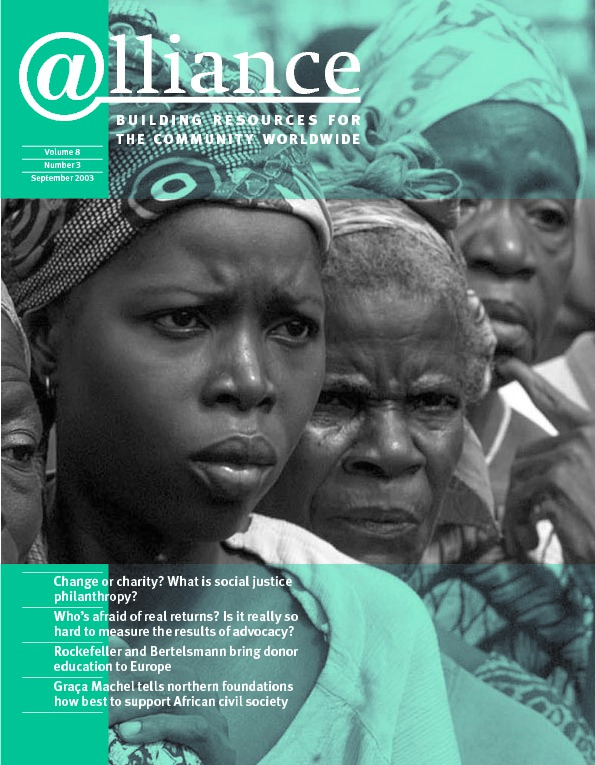While South Asia has a rich tradition of philanthropy, it is mostly directed to charitable and religious causes. South Asia also has vibrant and diverse civil societies. Social justice philanthropy is perhaps better looked at in the context of these civil societies rather than in connection with the more traditional forms of religious and charitable giving, which have had, for the most part, a curious disconnect from civil society efforts to advance social justice.
There are over 1.2 million civil society organizations (CSOs) in India alone, of which approximately half are not formally registered. Some work with the state or as subcontractors for the state, some work to reform the state or hold it accountable, and others are in direct conflict with the state. Associational life has a long and rich history in the region, drawing upon roots in the struggle for independence and later quests for nation-building.
Philanthropic traditions in the region, by contrast, are tied to religious or charitable causes, and giving is typically channelled to individuals or institutions personally known to the benefactor. Systematic giving through intermediary associations or foundations is rare, as is giving for social justice outcomes.
What is ‘social justice philanthropy’?
The term ‘social justice’ is familiar to activists, civil society leaders and government officials in South Asia, but the term ‘philanthropy’ is not as well known or understood and is often equated with charity. ‘Social justice philanthropy’ as a term is not widely used, although the concept and practice are embedded in various social movements and associations that mobilize resources to promote and secure rights for their members. Social justice philanthropy can address the barriers to participation and representation facing marginalized communities; support long-term systemic change rather than direct services; include communities affected by poverty and discrimination in their decision-making structures; and challenge imbalances of power and asymmetrical resource distribution.
The Dalit Foundation
‘Having a foundation focused upon one of the most marginalized communities in India who are affected by caste discrimination signals a shift within the field of philanthropy,’ says Martin Macwan, founding board member of the Dalit Foundation and Executive Director of the Navsarjan Trust in Gujarat, India. 160 million dalits live a precarious existence, shunned by much of society because of their status as ‘untouchables’ at the bottom of the caste system. They are discriminated against, denied access to land, forced to work in degrading conditions and routinely abused by police and higher-caste groups. Most live in extreme poverty, without opportunities for better employment or education. Dalit women face the triple burden of caste, class and gender.[1]
‘This foundation will support grassroots initiatives that don’t have access to major international donors, fight caste-based discrimination, and help develop dalit leadership, particularly among dalit women and rural dalit communities,’ says Macwan. Founded in the aftermath of the World Conference Against Racism as a partnership between several leading dalit activists, organizations and networks and the Ford Foundation, this could be a key foundation in promoting social justice philanthropy in the region. By ensuring that its governance and vision are community-based and grants are awarded to seed new and innovative initiatives, the Dalit Foundation will address issues and support groups that to date have not benefited from traditional philanthropic support.
Women’s funds
Two relatively more established efforts promoting social justice philanthropy are two women’s funds established with support from the Global Fund for Women: Tewa in Nepal and Nirnaya in Hyderabad, India. Tewa supports grassroots women’s groups in Nepal that promote economic development, women’s rights and empowerment. Dr Indira Jena, founder of Nirnaya, gives the following examples of social justice philanthropy: ‘support for advocacy; justice for dalits, religious minorities, sexual minorities, and, among these, women and girls in particular; reproductive rights; political participation in local self-governance; land entitlements for women; campaigns for women’s economic empowerment and fighting violence against women.’
Muslim philanthropy
COVA – a network of community-based organizations based in the old city area of Hyderabad – has set up a zakat[2] fund to mobilize resources from Muslims to support community development and economic justice rather than purely charitable giving to individuals. It is also participating in a comparative research project on philanthropy in Muslim communities. ‘Muslims are disproportionately affected by poverty and discrimination,’ says Mazher Hussain of COVA. ‘Traditional philanthropic organizations do not typically support Muslims. Giving within Muslim communities typically supports relief and charitable activities, which are important, but don’t get at addressing root causes of poverty and discrimination, and don’t build institutions.’
Funding challenges
Challenges are many, with the foremost being engagement with and support from domestic donors. However, domestic support –individual or institutional – is rare for issues of rights, social justice and pluralism. Despite having the largest middle class in the world and an affluent diaspora, CSOs and social justice philanthropies in India have been mostly unsuccessful at systematically tapping this wealth. ‘We can get donors to support programmes for education of the “girl child” or for rehabilitation of widows,’ says Jena. ‘However, it is difficult to engage with them on issues such as women’s rights.’ Jena terms this reluctance ‘fear of change’.
The Neelan Tiruchelvam Trust in Sri Lanka faces similar challenges in engaging domestic donors to support work around peace and pluralism. ‘Early philanthropists gave generously for the building of schools, hospitals and churches, but the goodwill often related to religious faith,’ says Sithie Tiruchelvam, Trust Chair. ‘These interventions were made in a spirit of benevolence and charity, without seeking an improved society.’ The Trust makes small grants to individuals and organizations addressing the critical issues of peace and reconciliation, but little domestic support is forthcoming. Most major donors are international foundations.
Another challenge related to individual donors is one that faces all philanthropic organizations – that of being the intermediary. Individual donors prefer to have a direct connection with the projects they support, get credit for their work, and feel certain that the funds are being utilized properly. Many are deeply suspicious of the need for professional paid staff or intermediary organizations such as foundations. These fears are also linked to issues of CSO credibility and accountability. Donors often apply ‘business principles’ to their giving and focus on concrete, time-bound outcomes and tangible returns on investment, which are difficult to demonstrate when supporting social justice work.
Many of the complex and pressing issues in the region today – communalism, minority rights, government accountability, corruption, oppression on the basis of caste, gender, religion, etc – can be sensitive for governments, which regulate the NGO sector and approve flows of foreign funds.
Fundraising as movement building
While social justice philanthropy could raise support from individuals concerned about or affected by social justice issues, in South Asia traditional fundraising efforts usually focus on corporations, wealthy individuals and family trusts, which are probably disinclined to support work of this nature. The groups that might actually support this work are generally not targeted.
But the Dalit Foundation is planning to approach not only international agencies familiar with and sympathetic to the dalit cause, but also domestic allies who might be willing to support this effort. ‘At our first board meeting, we decided to ask all board members to approach friends, partner organizations, networks, coalitions, business partners, and others to contribute small but significant amounts. We could then be considered not just as a funding agency but as an organization with a base,’ says Macwan. Part of the potential funding base could be dalits themselves, some of whom have benefited from affirmative action policies in education and employment and are committed to supporting an end to caste-based discrimination. New board member Sayeeda Hameed emphasizes the importance of raising funds from other marginalized communities, so as to build solidarity and strengthen coalitions. Social justice philanthropy is viewed not just as resource mobilization but as an essential component of movement building.
Social justice philanthropy faces challenges in obtaining domestic resources and demonstrating visible impact within defined timeframes. Its potential lies in being able to support issues that international funders may be sensitive about supporting, nurturing new voices and grassroots leadership amidst disenfranchised communities, and working side by side with movements, networks and coalitions in order to strengthen the process of social change.
1 Adapted from Human Rights Watch (1999) Broken People: Caste violence against India’s ‘Untouchables’, pp1–2.
2 Zakat is almsgiving that is obligatory within the Muslim faith. See also Alliance Vol 5, No 1, pp15–17.
Sushma Raman is a Program Officer for Philanthropy and Civil Society in the Ford Foundation’s New Delhi office. She can be contacted at s.raman@fordfound.org






Comments (0)